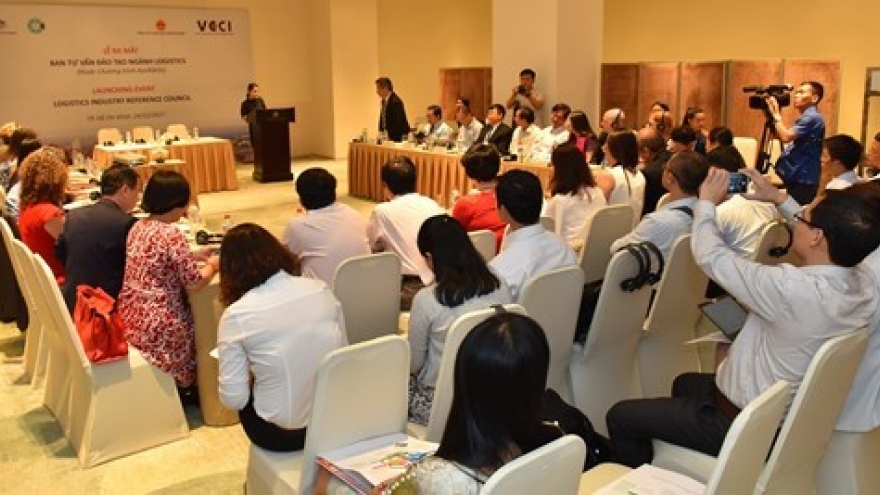Vietnam’s logistics costs make up 20.8% of GDP
VOV.VN - Vietnam’s logistics costs remain high, equivalent to over 20% of GDP while these costs account for between 9% and 14% of GDP in developed countries, according to the Vietnam Logistics Association.
 |
The event takes place in the context that Vietnam is expediting the Doi Moi (Renewal) process to keep abreast with the fourth industrial revolution.
At the conference, delegates heard reports by the Vietnam Logistics Association, the World Bank, and Vietjet Air Cargo on an action plan for logistics sector and how to turn Vietnam into a regional air logistics hub. They were also updated with the latest situation of Vietnam’s logistics sector.While significant progress has been made in investment in hard infrastructure, there is a large agenda for improving Vietnam’s logistics performance as evidenced by drop in the country’s ranking in the Logistics Performance Index from 2014 to 2016 from 48 to 64.
High on the agenda at the forum was improving competitiveness and the development of Vietnam’s logistics services. Vietnam’s total logistics costs in 2016 were US$41.26 billion, equivalent to 20.8% of GDP.
Scholars at the forum engaged in a debate on strategic issues facing the development of Vietnam’s logistics sector at present and in future, saying despite high logistics costs, the logistics sector has contributed a mere 3% to GDP.
According to statistics supplied at the forum, the number of logistics enterprises in Vietnam has grown rapidly from 700 in 2005 to more than 1,200 in 2012 with an annual service growth rate of 16-20%.
At present, about 30 businesses providing trans-national logistics services are operating in Vietnam and approximately 1,300 out of 3,000 logistics businesses in the country are focusing their operations domestic and foreign markets.
“A strategy to enhance trade competitiveness in complementarity to trade liberalization is needed to support Vietnam’s vision of becoming an upper middle -income country by 2035 with a more sophisticated economy and exports that sustain accelerated growth,” says Ousmane Dione, the World Bank Country Director for Vietnam. Accordingly, there is a need for the Government and the private sector to define a clear agenda for reform if the quality of logistics services is to be raised, to meet the demand of an increasingly sophisticated economy.”
The country’s consistent policy of openness and export-led growth has paid off well. However, Vietnam often carries out the lowest value-added segment of production in global value chains.The Vietnam Logistics Report 2017 was also launched on this occasion.
The report provides a close look at the inherent vantage points and dynamics of international markets, revealing Vietnam logistics sector’s great potential for growth and deep integration in the global logistics arena.
The annual report reviews, assesses and informs the current state and outlook of the logistics market in Vietnam and the world, analyzes the relevant regulations and policies in the field, and informs on public sector management, production, trade and investment by businesses, research and communication in the logistics field.
The report suggests that in 2018, more focus should be paid to fast-track administrative reforms, reduce or simplify logistics-related administrative procedures, and accelerate key logistics infrastructure projects.
Authorities, associations and businesses should also look at embedding regional integration and partnership efforts in market liberalization, expanding existing logistics training system, and increasing communication, and further perfection of the regulatory framework and public sector management system to support logistics development.
Minister of Industry and Trade Tran Tuan Anh highly appreciated the development of logistics in Vietnam in recent years, saying logistics services have made significant contributions to economic growth, expansion and development of international markets, consumers’ increased rate of enjoyment and the country’s economic restructuring.
Mr Tuan Anh also identified several limitations of the logistics industry such as a lack of close linkages between relevant agencies, poor transport infrastructure, weak information technology, human resources, and competitive capacity of local businesses compared to those in the region and around the world.
The Vietnam Logistics Forum is organized by Ministry of Industry and Trade, Ministry of Transport, the Vietnam Logistics Business Association, the Vietnam Economic Times, and the World Bank in Vietnam, with financing from the Australia-Bank Partnership Trust Fund.



